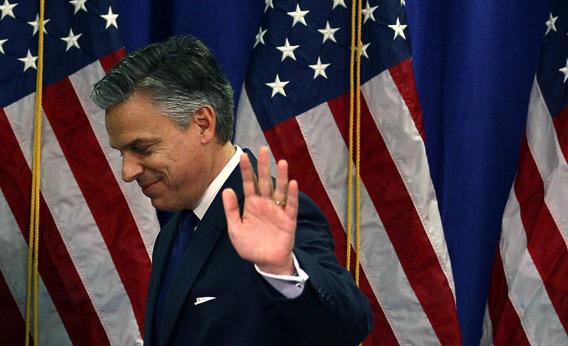My vote didn’t matter, and I am guessing yours won’t either. You probably didn’t caucus in Iowa or plant yourself at the bar in American Samoa. You might not even live in Florida, which would make candidates care about you after the primary is over. Congratulations! We’re basically irrelevant.
Ah, but I’ve figured out how to make politicians pay attention to me. Since 2007, I’ve been a registered Republican in Washington, D.C. There are not very many of us. The last time the primary came here, in a city of 617,966, only 6,211 of us turned out to vote. How many Democrats turned out? Only 20 times as many: 123,994 of them. Us lucky Republican voters got to be statistically significant. All they got was the 44th president.
I wasted my vote anyway. Slate tradition demands that we admit whom we vote for. ’Fess-up time: Jon Huntsman got at least one vote out of Washington, D.C., Precinct 46. My candidate dropped out of the race three months ago. I used to wonder about the kinds of people who punch the “Herman Cain” button now that he’s turned his attention away from campaigning and over to surrealist art. Now I’m one of them.
How did every other candidate lose me? Rick Santorum forfeited and never made the D.C. ballot. Every other candidate made it to a pro-con list, then got inked out for some vital reason.
Newt Gingrich nearly won my vote. When the legit-looking e-voting machine displayed his name, I was tempted. Gingrich had identified what was wrong with the campaign long ago: People kept making fun of him. “The thing I find most disheartening about this campaign,” he said last week, “is the difficulty of talking about positive ideas on a large scale because the news media can’t cover it.” Ha, ha! Laugh so you don’t weep.
The theory of the Gingrich campaign—brain-science speeches, open Q&As at black churches—was brilliant. The theory didn’t last. Under pressure, Gingrich would pivot to the looming “war on religion,” or how people thought Obama was a Muslim because of his foreign policy, and so on. That wasn’t really new. In his prime, Gingrich combined Tofflerian idea promotion with raw politics and liberal-baiting. Also, in his prime, Gingrich was one of the politicians who decided to squander one of the most prosperous years in American history on Bill Clinton’s sex scandal. I couldn’t reward Gingrich’s good behavior without accidentally rewarding all of his bad turns.
Mitt Romney did not flirt with an “ideas” campaign. At least 18 minutes of my campaign-trail recordings consist of Romney reciting or singing “America the Beautiful.” His strategy: Win just about enough Republicans to grind out a nomination in a year that the incumbent might lose. It will almost surely work, so Romney doesn’t need any more help.
You need to understand that I like “ideas” campaigns, and I didn’t want to vote for the obvious winner. Why didn’t I just submit to Ron Paul? Two reasons, and one of them probably makes sense. First, the stupid reason: Paul has run for president three times. You can see a Ron Paul banner in the background of a scene in Slacker, filmed in Austin in the late 1980s (one of the best movies ever made). You can still find pro-Paul outsider art on assorted D.C. lampposts, promoting his 2008 campaign. I registered Republican so I could pick Paul that year. His 2012 campaign is the last chapter of a long, fitfully successful libertarian crusade. It already got my vote.
The other, more sensible reason I stiffed Paul: the newsletter story. When the worst paragraphs of the old Ron Paul Survival Report first surfaced, in 1996, Paul apologized. When they came up again in 2008, he said he didn’t know who wrote them. The media re-re-rediscovered them in December 2011, and Paul denounced them while not denying that he knew the authors. Fine, then. It’s a mystery. Somebody else can endorse it.
The lengthy process of judgment and scowling left me with a choice. Should I waste my vote by writing somebody’s name in? Should I go for the faux liberal candidate who is now auditioning for a stool on Morning Joe? It was a low-reward choice, and an easy one. If you looked past his whiff of a tax plan (Huntsman recommended using the flat rates that Simpson and Bowles recommended not using), the guy had a few good ideas. The worst knock on him during the brief period when he looked relevant was that he sat with a Slate writer for a long profile. That’s a lousy reason to vote against somebody.
So Huntsman it was. Bias disclosed. Really, it wasn’t personal.
